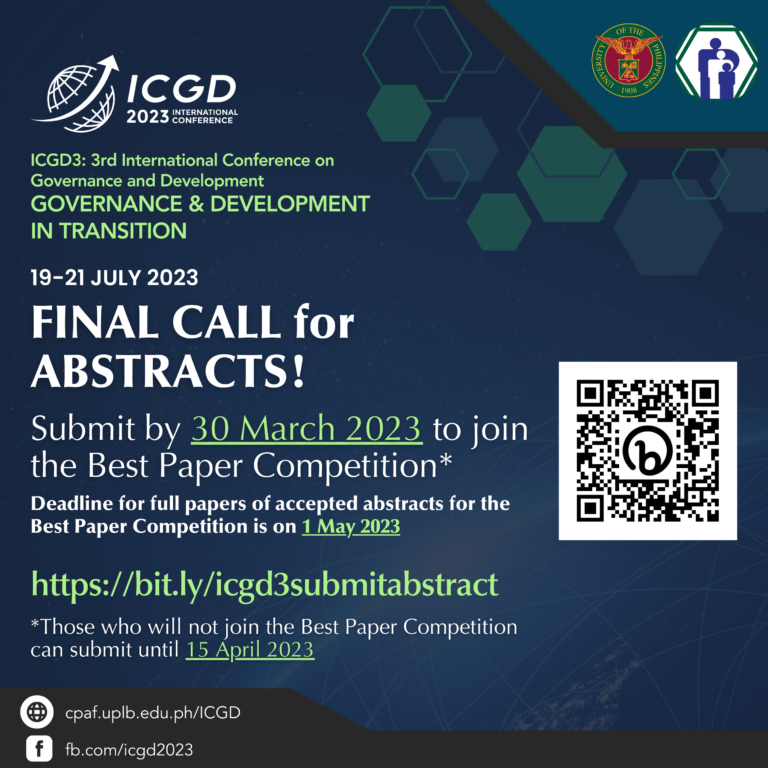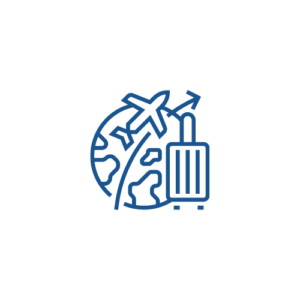
GUIDELINES
Abstracts are expected to respond to the conference agenda and its subsequent research questions:

Institutions in transition
- What transitions do communities and institutions face locally, regionally, and globally?
- How does leadership address transition issues related to, but not limited to, pandemic, education crisis, growing inequality, human and social security, climate emergency, gender injustice, and others?
- How will institutional innovations, such as in agricultural and rural development, enhance human capabilities and capacities in communities in transition?

New ways of rethinking governance and development
- In what ways do our traditional lens and analyses able to analyze and predict governance and development pathways after social, political, and economic transitions?
- How can data and information shape critical policy decisions?
- What are the new ways of opening governance to accommodate broad-based forms of governmental regimes?

Shared future and prosperity
- After these transitions, how do institutions forge partnerships and cooperation toward shared prosperity?
- How can the social, political, and economic pressures transform how we think about sustainability?
- How can institutions reinvent and innovate toward rights-based and people-centered growth and development?

Authors/presenters have the following options in submitting their abstracts:
- Apply to the accepted open panels. Authors are encouraged to read the descriptions of the open panels to determine if their submissions align to its aims, or
- Submit a paper abstract and be open to being grouped with other accepted authors.
Acknowledgment letters will be sent to confirm successful submission.

Submit a maximum of 250-word abstract on or before 30 March 2023
by scanning the QR code above or through the link, https://bit.ly/icgd3submitabstract.
For those intending to compete for the Best Paper, submission of full papers are expected to be received by 1 May 2023.
OPEN PANELS

4IR in Local Governance and Development
This plenary session invites papers sharing evidence and practice-based insights about the efficacies and challenges in applying digital technologies in the creation of desired local development pathways. Topics include but are not limited to the extent of e-governance practice in local governments, use of digital technologies in policy

Advances and Innovations in Disaster Risk Governance
This panel invites papers on the field of disaster risk reduction and management (DRRM), particularly on issues and practices in its governance. We seek papers/presentations which highlight changes/innovations/advances in Disaster Risk Governance. We also accept papers on the challenges and needs of mainstreaming DRRM.

Developing Competencies for Local Governance: From Knowledge to Practice
This panel invites papers which demonstrate how academic institutions responded to development challenges by addressing governance issues. Case studies and process documentations on school programs that have influenced development focused agenda of LCEs will be given highlight.

Development Management and Governance in the Changing Times
This panel examines the appreciation of development management and governance (DM&G) from the lenses of public and private institutions and civil society. It focuses on understanding what DM&G is as a field of study, and its role in program and institutional development in the changing times.

Emerging Scholars (Full papers only)
- The applicant must be a current student or a recent graduate (not more than 2 years) in Public Affairs or related fields;
- The paper that will be submitted should not be published or under the process of review; and
- Applicants should have an accepted abstract and a submitted full paper. See the guidelines for abstract and full paper.

Lessons and Imperatives on Tourism Development in the Philippines
This panel invites papers on tourism development and the role of government and non-government actors in goal and strategy formulation and outcome achievement. We seek papers that expound on the effectiveness and challenges associated with tourism development, the role of stakeholders and the underlying factors that hinder or facilitate good outcomes.

Poverty with Context: Alternative Poverty Diagnostics in the Philippines
This panel invites papers examining the nuances of poverty. It includes studies on its nature, causes, sources, and dimensions. We also seek studies that can provide alternative ways of looking at poverty, which can be used to offer policy insights into solving this perennial problem.

Quality Culture of Higher Education Institutions and its Influence to its Institutional Outcomes
In this panel, we invite papers that illustrate how quality culture drives institutional outcomes in graduate programs. Specifically, we seek empirical and conceptual papers about how organizations embed quality and transform their internal and external processes and content in order to achieve better results.

Structural Transformation and Inclusive Growth (Full papers only)
This sponsored panel aims to critically examine the emerging modalities of economic growth and development with reference to developing countries in Asia and the Pacific. We welcome original and unpublished empirical research methodologies which probe the underpinnings of the structural transformation of economies and its implications for inclusive and broad-based development. Papers with clear implications for policy and practice are preferred.

Transformations in Agriculture for Food System Resilience
This panel invites papers that critically examine and push the frontiers of knowledge at the nexus of science, policy and practice in food systems transformation. We especially seek analytical work (re)framing perspectives and approaches to food system governance, empirical case studies as well as modelling studies informing the scalability of innovative policy, structural-institutional, program and financing strategies, technologies and tools addressing food security-related Sustainable Development and Climate Resilience Goals.
MARIA KRISTINA G. ALINSUNURIN, PhD
Assistant Professor and Chair
3rd International Conference on Governance and Development
